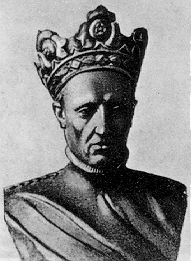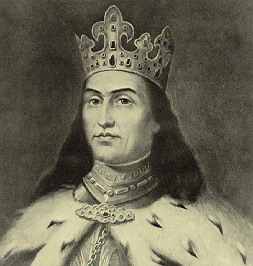Minsk History:
The Early Years of the Grand Duchy
Little is known of the history of the city under the early Grand Duke Vajszelak(d.
1269), Trojdzen(1271 - 1282), and Lutaver (1282 - 1295). In 1323, during the reign of
Hedymin (1316 - 1341), the capital of the Grand Duchy was moved from the Navahrudak to
Vilnia.
The Kinf of Poland and Grand Duke Jahajla
 The
fact that Prince Jaunut Hedyminavicz received from the Grand Duke Kejstut the principality
of Zaslaue, and reigned in Minsk in 1345, where he was succeeded his son Michal, suggests
that the city was by then a royal suzerainty. Prince Michal was present at the coronation
in 1386 of Grand Duke Jahajla as King of Poland in Krakow, and gave his oath of allegiance
"for himself and his own". In 1390 Jahajla endowed a Catholic Church in Minsk
dedicated to the Holy Trinity and Ascension of Our Lady, perhaps in part performance of
his written bond on his marriage in 1389 to Queen Jadviha of Poland, to establish
Latic-rite Catholicism in his domains; its site in the city is not known, and the wooded
building is reputed to have been destroyed by fire in 1409. Many of the suzerains of the
Russian principalities to the east of Smalensk, anxious for protection against Moscow --
now reduced to a state of Tatar satrapy, -- sought alliance or union with the Grand Duchy
of Lithuania, so that soon the Grand Duke Alhierd(1345 - 1377) acquired the title of Rex
Litvinorum Ruthenorumque, with domains stretching from the Baltic to the Black Sea.
The
fact that Prince Jaunut Hedyminavicz received from the Grand Duke Kejstut the principality
of Zaslaue, and reigned in Minsk in 1345, where he was succeeded his son Michal, suggests
that the city was by then a royal suzerainty. Prince Michal was present at the coronation
in 1386 of Grand Duke Jahajla as King of Poland in Krakow, and gave his oath of allegiance
"for himself and his own". In 1390 Jahajla endowed a Catholic Church in Minsk
dedicated to the Holy Trinity and Ascension of Our Lady, perhaps in part performance of
his written bond on his marriage in 1389 to Queen Jadviha of Poland, to establish
Latic-rite Catholicism in his domains; its site in the city is not known, and the wooded
building is reputed to have been destroyed by fire in 1409. Many of the suzerains of the
Russian principalities to the east of Smalensk, anxious for protection against Moscow --
now reduced to a state of Tatar satrapy, -- sought alliance or union with the Grand Duchy
of Lithuania, so that soon the Grand Duke Alhierd(1345 - 1377) acquired the title of Rex
Litvinorum Ruthenorumque, with domains stretching from the Baltic to the Black Sea.
The Grand Duke Vitaut
 Union did not imply subservience however; and it is noted by Syrakomla that the banner of
Minsk was not among the united army of Lithuanians, Belarusians, and Poles, who under
Grand Duke Vitaut(1392 - 1430) defeated the Teutonic Order at the Battle of Gruenwald in
1410. The city had sided with Grand Duke Svidrihajla in a dynastic dispute against Grand
Duke Hedymin, and Prince Urustaj of Minsk appeared in 1408, as a witness to a Treaty of
mutual aid signed by Svidrihajla and the Grand Duke Basil of Moscow. The establishment of
Minsk as a Namiesnictva(Royal Shire) coincided with the absence, noted by
Syrakomla, of the city's seal from the Charter of Horadla in that year, -- though few
other noblemen of the Greek rite were present at the conference. Thereafter the city
appears to have been governed by a namiesnik of Sheriff representing the Grand
Ducal authority as hereditary Prince of Zaslaue. This might indicate that Minsk had
declined in importance since the Mongol invasions, the sack of Kiev, and the growing
threat to the Black Sea trade from the advancing Turks. The fall of Constantinople in 1453
and the subjection of Crimean Tatars to Ottoman rule in 1475, were to have far reaching
effects on the economic, political, and religious life in Minsk, and indeed of the whole
Grand Duchy.
Union did not imply subservience however; and it is noted by Syrakomla that the banner of
Minsk was not among the united army of Lithuanians, Belarusians, and Poles, who under
Grand Duke Vitaut(1392 - 1430) defeated the Teutonic Order at the Battle of Gruenwald in
1410. The city had sided with Grand Duke Svidrihajla in a dynastic dispute against Grand
Duke Hedymin, and Prince Urustaj of Minsk appeared in 1408, as a witness to a Treaty of
mutual aid signed by Svidrihajla and the Grand Duke Basil of Moscow. The establishment of
Minsk as a Namiesnictva(Royal Shire) coincided with the absence, noted by
Syrakomla, of the city's seal from the Charter of Horadla in that year, -- though few
other noblemen of the Greek rite were present at the conference. Thereafter the city
appears to have been governed by a namiesnik of Sheriff representing the Grand
Ducal authority as hereditary Prince of Zaslaue. This might indicate that Minsk had
declined in importance since the Mongol invasions, the sack of Kiev, and the growing
threat to the Black Sea trade from the advancing Turks. The fall of Constantinople in 1453
and the subjection of Crimean Tatars to Ottoman rule in 1475, were to have far reaching
effects on the economic, political, and religious life in Minsk, and indeed of the whole
Grand Duchy.
![[Previous]](../../images/misc/previous.gif)
![[Up]](../../images/misc/up.gif)
![[Next]](../../images/misc/next.gif)
 The
fact that Prince Jaunut Hedyminavicz received from the Grand Duke Kejstut the principality
of Zaslaue, and reigned in Minsk in 1345, where he was succeeded his son Michal, suggests
that the city was by then a royal suzerainty. Prince Michal was present at the coronation
in 1386 of Grand Duke Jahajla as King of Poland in Krakow, and gave his oath of allegiance
"for himself and his own". In 1390 Jahajla endowed a Catholic Church in Minsk
dedicated to the Holy Trinity and Ascension of Our Lady, perhaps in part performance of
his written bond on his marriage in 1389 to Queen Jadviha of Poland, to establish
Latic-rite Catholicism in his domains; its site in the city is not known, and the wooded
building is reputed to have been destroyed by fire in 1409. Many of the suzerains of the
Russian principalities to the east of Smalensk, anxious for protection against Moscow --
now reduced to a state of Tatar satrapy, -- sought alliance or union with the Grand Duchy
of Lithuania, so that soon the Grand Duke Alhierd(1345 - 1377) acquired the title of Rex
Litvinorum Ruthenorumque, with domains stretching from the Baltic to the Black Sea.
The
fact that Prince Jaunut Hedyminavicz received from the Grand Duke Kejstut the principality
of Zaslaue, and reigned in Minsk in 1345, where he was succeeded his son Michal, suggests
that the city was by then a royal suzerainty. Prince Michal was present at the coronation
in 1386 of Grand Duke Jahajla as King of Poland in Krakow, and gave his oath of allegiance
"for himself and his own". In 1390 Jahajla endowed a Catholic Church in Minsk
dedicated to the Holy Trinity and Ascension of Our Lady, perhaps in part performance of
his written bond on his marriage in 1389 to Queen Jadviha of Poland, to establish
Latic-rite Catholicism in his domains; its site in the city is not known, and the wooded
building is reputed to have been destroyed by fire in 1409. Many of the suzerains of the
Russian principalities to the east of Smalensk, anxious for protection against Moscow --
now reduced to a state of Tatar satrapy, -- sought alliance or union with the Grand Duchy
of Lithuania, so that soon the Grand Duke Alhierd(1345 - 1377) acquired the title of Rex
Litvinorum Ruthenorumque, with domains stretching from the Baltic to the Black Sea.  Union did not imply subservience however; and it is noted by Syrakomla that the banner of
Minsk was not among the united army of Lithuanians, Belarusians, and Poles, who under
Grand Duke Vitaut(1392 - 1430) defeated the Teutonic Order at the Battle of Gruenwald in
1410. The city had sided with Grand Duke Svidrihajla in a dynastic dispute against Grand
Duke Hedymin, and Prince Urustaj of Minsk appeared in 1408, as a witness to a Treaty of
mutual aid signed by Svidrihajla and the Grand Duke Basil of Moscow. The establishment of
Minsk as a Namiesnictva(Royal Shire) coincided with the absence, noted by
Syrakomla, of the city's seal from the Charter of Horadla in that year, -- though few
other noblemen of the Greek rite were present at the conference. Thereafter the city
appears to have been governed by a namiesnik of Sheriff representing the Grand
Ducal authority as hereditary Prince of Zaslaue. This might indicate that Minsk had
declined in importance since the Mongol invasions, the sack of Kiev, and the growing
threat to the Black Sea trade from the advancing Turks. The fall of Constantinople in 1453
and the subjection of Crimean Tatars to Ottoman rule in 1475, were to have far reaching
effects on the economic, political, and religious life in Minsk, and indeed of the whole
Grand Duchy.
Union did not imply subservience however; and it is noted by Syrakomla that the banner of
Minsk was not among the united army of Lithuanians, Belarusians, and Poles, who under
Grand Duke Vitaut(1392 - 1430) defeated the Teutonic Order at the Battle of Gruenwald in
1410. The city had sided with Grand Duke Svidrihajla in a dynastic dispute against Grand
Duke Hedymin, and Prince Urustaj of Minsk appeared in 1408, as a witness to a Treaty of
mutual aid signed by Svidrihajla and the Grand Duke Basil of Moscow. The establishment of
Minsk as a Namiesnictva(Royal Shire) coincided with the absence, noted by
Syrakomla, of the city's seal from the Charter of Horadla in that year, -- though few
other noblemen of the Greek rite were present at the conference. Thereafter the city
appears to have been governed by a namiesnik of Sheriff representing the Grand
Ducal authority as hereditary Prince of Zaslaue. This might indicate that Minsk had
declined in importance since the Mongol invasions, the sack of Kiev, and the growing
threat to the Black Sea trade from the advancing Turks. The fall of Constantinople in 1453
and the subjection of Crimean Tatars to Ottoman rule in 1475, were to have far reaching
effects on the economic, political, and religious life in Minsk, and indeed of the whole
Grand Duchy.